Related Research Articles
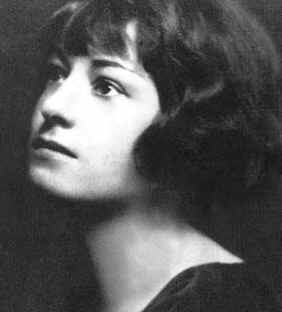
Dorothy Parker was an American poet and writer of fiction, plays and screenplays based in New York; she was known for her caustic wisecracks, and eye for 20th-century urban foibles.
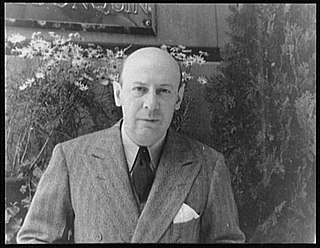
Marcus Cook Connelly was an American playwright, director, producer, performer, and lyricist. He was a key member of the Algonquin Round Table, and received the Pulitzer Prize for Drama in 1930.
Charles Gordon MacArthur was an American playwright, screenwriter, and 1935 winner of the Academy Award for Best Story.
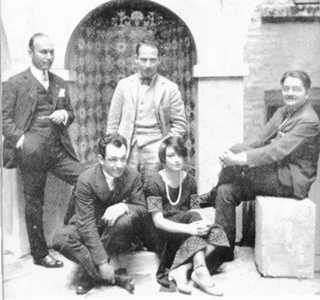
The Algonquin Round Table was a group of New York City writers, critics, actors, and wits. Gathering initially as part of a practical joke, members of "The Vicious Circle", as they dubbed themselves, met for lunch each day at the Algonquin Hotel from 1919 until roughly 1929. At these luncheons they engaged in wisecracks, wordplay, and witticisms that, through the newspaper columns of Round Table members, were disseminated across the country.
A revue is a type of multi-act popular theatrical entertainment that combines music, dance, and sketches. The revue has its roots in 19th century popular entertainment and melodrama but grew into a substantial cultural presence of its own during its golden years from 1916 to 1932. Though most famous for their visual spectacle, revues frequently satirized contemporary figures, news or literature. Similar to the related subforms of operetta and musical theatre, the revue art form brings together music, dance and sketches to create a compelling show. In contrast to these, however, revue does not have an overarching storyline. Rather, a general theme serves as the motto for a loosely related series of acts that alternate between solo performances and dance ensembles.
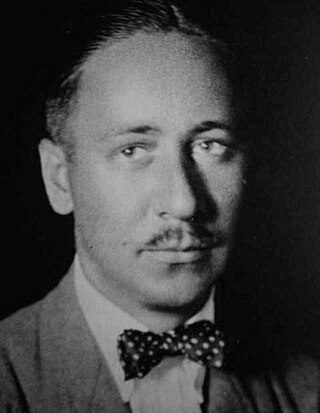
Robert Charles Benchley was an American humorist best known for his work as a newspaper columnist and movie actor. From his beginnings at The Harvard Lampoon while attending Harvard University, through his many years writing essays and articles for Vanity Fair and The New Yorker and his acclaimed short films, Benchley's style of humor brought him respect and success during his life, from his peers at the Algonquin Round Table in New York City to contemporaries in the burgeoning film industry.

Franklin Pierce Adams was an American columnist known as Franklin P. Adams and by his initials F.P.A. Famed for his wit, he is best known for his newspaper column, "The Conning Tower", and his appearances as a regular panelist on radio's Information Please. A prolific writer of light verse, he was a member of the Algonquin Round Table of the 1920s and '30s.

Mrs. Parker and the Vicious Circle is a 1994 American biographical drama film directed by Alan Rudolph from a screenplay written by Rudolph and Randy Sue Coburn. The film stars Jennifer Jason Leigh as writer Dorothy Parker and depicts the members of the Algonquin Round Table, a group of writers, actors and critics who met almost every weekday from 1919 to 1929 at Manhattan's Algonquin Hotel.

Robert Emmet Sherwood was an American playwright and screenwriter.
Nathaniel Goddard Benchley was an American author from Massachusetts.
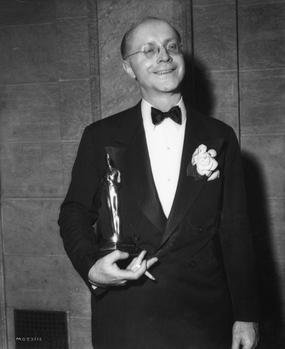
Donald Ogden Stewart was an American writer and screenwriter best known for his sophisticated golden age comedies and melodramas such as The Philadelphia Story, Tarnished Lady and Love Affair. Stewart worked with a number of the directors of his time, including George Cukor, Michael Curtiz and Ernst Lubitsch. Stewart was a member of the Algonquin Round Table and, with Ernest Hemingway's friend Bill Smith, the model for Bill Gorton in The Sun Also Rises. His 1922 parody on etiquette, Perfect Behavior, published by George H. Doran and Co., was a favourite book of P. G. Wodehouse.

The Ten-Year Lunch: The Wit and Legend of the Algonquin Round Table is a 1987 American documentary film by Aviva Slesin.

Nathaniel Robert "Nat" Benchley is an American actor who has performed for stage, television, and cinema.

The Reluctant Dragon is a 1941 American live-action/animated anthology comedy film produced by Walt Disney, directed by Alfred Werker, and released by RKO Radio Pictures on June 27, 1941. Essentially a tour of the then-new Walt Disney Studios facility in Burbank, California, the film stars Algonquin Round Table member, film actor, writer and comedian Robert Benchley and many Disney staffers such as Ward Kimball, Fred Moore, Norman Ferguson, Clarence Nash, and Walt Disney, all as themselves.
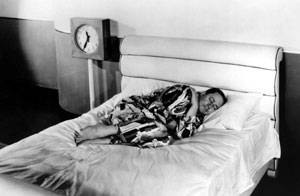
How to Sleep is a short comedy film written by and starring humorist Robert Benchley. Filmed and released by MGM in 1935, it features Benchley as a narrator as well as film subject, discussing four parts of sleep—causes, methods, avoiding sleep, and waking up.
Music Box Revue was a series of four musical theatre revues by Irving Berlin, presented from 1921 to 1924 at the Music Box Theatre in New York City. Berlin wrote the book, music, and lyrics to all four editions. The first show was staged by Hassard Short with music by Irving Berlin, and featured contributions from a number of writers including Robert Benchley. it debuted in 1921, where it ran for 440 performances.

The Sex Life of the Polyp is a 1928 short film written and performed by Robert Benchley, based on a routine he first did in 1922. The short, which was adapted from an essay by Benchley, documents a dim-witted doctor attempting to discuss the sex life of a polyp to a women's club. This was the second of Benchley's 46 comedy short films, with six made for Fox, one each for Universal Pictures and RKO Radio Pictures, 29 for Metro-Goldwyn-Mayer, and nine for Paramount Pictures.

La Chauve-Souris was the name of a touring revue during the early 1900s. Originating in Moscow and then Paris, and directed by Nikita Balieff, the revue toured the United States, Europe, and South Africa. The show consisted of songs, dances, and sketches, most of which had been originally performed in Russia. The revue was enormously successful in the U.S., and one of its legacies is the popularization of the jaunty tune The Parade of the Wooden Soldiers by Leon Jessel.
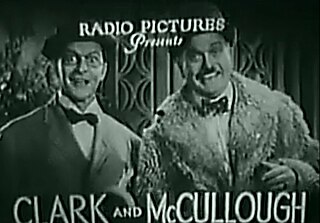
Paul Johnston McCullough was an American actor and comedian who was one half of the comedy duo Clark and McCullough, along with fellow comedian Bobby Clark.
References
- ↑ Kunkel, Thomas (1995). Genius in Disguise: Harold Ross of The New Yorker. New York: Carroll & Graf Publishers (paperback). pp. 81. ISBN 0-7867-0323-7.
- ↑ Altman, Billy (1997). Laughter's Gentle Soul: The Life of Robert Benchley. New York: W. W. Norton & Company. pp. 204. ISBN 0-393-03833-5.
- ↑ Altman, p. 206
- ↑ Altman, pp. 208-9
- ↑ Internet Movie Database. "The Treaurer's Report". IMDb . Retrieved September 3, 2007.
- ↑ Internet Movie Database. "Robert Benchley". IMDb . Retrieved September 3, 2007.
- ↑ Altman, p. 358
- ↑ Kino. "Robert Benchley and the Knights of the Algonquin" . Retrieved September 3, 2007.